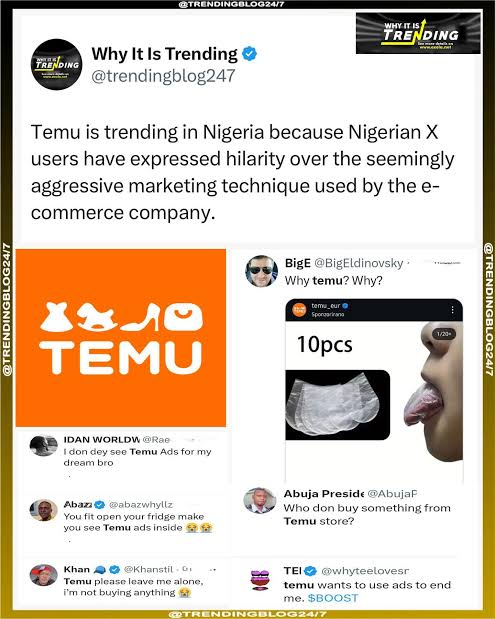Have you heard the buzz about Temu? This online shopping platform has taken the world by storm, and Nigeria is no exception.
Temu is a Chinese e-commerce company that sells a wide range of products at low prices. With its vast display of affordable products, convenient shopping experience, and rapid delivery, Temu is quickly becoming a favorite among Nigerian shoppers.
In this article, we will dive into what Temu is, and its entry into the Nigerian online shopping market.
Key Takeaways
- A glance at Temu’s app or website reveals a diverse range of products, from sturdy work boots to assistive devices for the elderly and pregnant women.
- While popular online shopping platforms like Jumia and Konga exist in Nigeria, they have not fully dominated the market.
- There is still room for a major player like Temu, which could disrupt the industry with its incredibly low prices and strong marketing even for big players like Amazon.
A Backstory on Temu

The e-commerce industry in Nigeria and Africa is experiencing rapid growth, driven by increasing internet penetration, smartphone usage, and a growing middle class. This market is not only limited to Nigeran e-commerce companies but also international players like Temu.
Founded in July 2022, in Boston, Massachusetts, United States, Temu is an online store and app that connects consumers with sellers, primarily from China. It offers a variety of items, including clothing, beauty products, electronics, and household items.
So many people struggle with the right pronunciation of Temu. Temu is pronounced (“teh-moo”) with the ‘teh’ sounding like the letter ‘t’, and ‘moo’ making the sound of a cow.
Temu is owned by PDD Holdings, formerly known as Pinduoduo, which is owned by former Google employer, Colin Huang.
PDD has consistently rivaled Alibaba for the title of China’s most valuable company listed on a US stock exchange. Currently valued at nearly $150 billion, PDD has captured the hearts of Chinese consumers. Capitalizing on its domestic success, PDD expanded its reach globally with the launch of Temu. This new venture employs the same business model that propelled PDD to prominence.
In a BBC report on Temu, Shanghai-based analyst, Mr. Rein, highlights the significant national pride associated with PDD’s achievements. He explains, “Chinese consumers are proud that their homegrown companies can compete with and surpass American e-commerce giants like Amazon.
A glance at Temu’s app or website reveals a diverse range of products, from sturdy work boots to assistive devices for the elderly and pregnant women. This vast array of manufactured goods, almost entirely sourced from Chinese factories, underscores PDD’s commitment to showcasing the capabilities of Chinese manufacturing.
Read also: 25 Websites You Can Make Money From
Temu’s unique selling points

Temu has carved out a niche in the e-commerce market by offering incredibly low prices as low as 90%. This is made possible by their direct-to-consumer business model, which eliminates the need for intermediaries like wholesalers and retailers.
By purchasing directly from manufacturers, Temu can significantly reduce costs and pass those savings on to their customers. In addition to low prices, Temu offers a range of other attractive features. Free standard shipping is available on almost all orders, making it even more cost-effective for customers.
The platform also encourages group buying, where customers can team up with friends to unlock further discounts. Temu’s credit system rewards loyal users with points that can be redeemed for future purchases. And for peace of mind, almost all items can be returned for free within 90 days of purchase.
With its vast selection of products spanning electronics, clothing, home goods, and beauty, Temu has successfully challenged established e-commerce giants like Amazon. By offering a compelling combination of low prices, convenient features, and a wide product range, Temu has captured the attention of consumers and disrupted the traditional retail landscape.
See also: 12 Authentic Hacks on How to Make Money on Amazon Without Selling
Temu’s entry into the Nigerian market

Temu is making its way to Nigeria after its launch in South Africa, and it’s not just a random move. There are several factors driving this decision.
First, Nigeria boasts a massive population of over 200 million people, making it the most populous country in Africa. This large population represents a vast pool of potential customers for Temu.
Also, Nigeria’s population is young and increasingly tech-savvy. With the widespread availability of affordable smartphones, a significant portion of the population now accesses the internet through mobile devices. This growing smartphone penetration has fueled the growth of e-commerce in Nigeria, creating a fertile ground for online marketplaces like Temu to thrive.
Moreover, Nigeria’s economic landscape also plays a role in Temu’s expansion. Rising inflation and a depreciating currency have put a strain on household budgets, forcing many Nigerians to prioritize affordability when making purchasing decisions. Temu’s core proposition of offering low-cost goods aligns perfectly with the needs of Nigerian consumers.
Temu also put out a winning strategy by investing in social media ads targeted towards Nigerians. As a result, Temu’s app reportedly is currently the most downloaded app on Google and Apple play stores with a download of 500 million so far on just Google play store.
Nigeria’s e-commerce sector is booming, with more and more people using the internet and smartphones. In 2019, the market was worth $12 billion, and it’s expected to reach a massive $75 billion by 2025. This growth is further fueled by the increasing use of digital payment methods, making online shopping safer and easier.
With many Nigerian influencers and Youtubers reviewing products they bought on Temu, more Nigerians are rising to the awareness of the Temu brand.

Temu’s Impact on the Nigerian online shopping market
Temu’s entry into the Nigerian online shopping market is poised to significantly disrupt the existing landscape. Its aggressive pricing strategy, coupled with a wide range of products, has the potential to attract a substantial consumer base.
Temu’s arrival in the Nigerian business space is exciting, however, it would not be easy. Unlike other Chinese companies that operate with fewer physical assets, Temu will have to deal with Nigeria’s challenging logistics system.
This means potential delays in deliveries, high shipping costs, and other infrastructure problems. These issues could affect customer satisfaction and give local competitors a chance to catch up.
Potential Impacts
- Increased competition: Temu’s low-cost model will intensify competition for established players like Jumia and Konga. Local retailers may need to adjust their pricing and marketing strategies to remain competitive.
- Lower prices for consumers: Consumers will likely benefit from lower prices on a variety of products, as Temu’s business model relies on direct sourcing from manufacturers and efficient logistics.
- Enhanced consumer choice: Temu’s diverse product range, including international brands and unique items, will expand consumer choices beyond what is typically available on local platforms.
- Challenges for local businesses: Local businesses, particularly small and medium-sized enterprises, may face challenges in competing with Temu’s scale and pricing power.
- Logistics and supply chain: Temu’s success will depend on its ability to navigate Nigeria’s complex logistics and supply chain infrastructure, ensuring timely and efficient deliveries.
While popular online shopping platforms like Jumia and Konga exist in Nigeria, they have not fully dominated the market. There is still room for a major player like Temu, which could disrupt the industry with its incredibly low prices and strong marketing even for big players like Amazon.
People also read: 6 Easy Ways on How to Make Money on Pinterest Fast
Conclusion
Temu’s low prices and wide selection of products have made it popular with more consumers across the globe.
Temu’s entry into the Nigerian market presents both opportunities and challenges for local businesses and consumers. By adapting to the changing landscape and leveraging their strengths, Nigerian businesses can continue to thrive in the growing e-commerce industry.
Frequently Asked Questions
What is the Temu sales strategy?
Temu’s major sales strategy is their offer of ultra-low prices.
What makes Temu successful?
Temu’s marketing success involves in a mix of affordability, social proof and digital engagement techniques like FOMO and gamification on the app.


